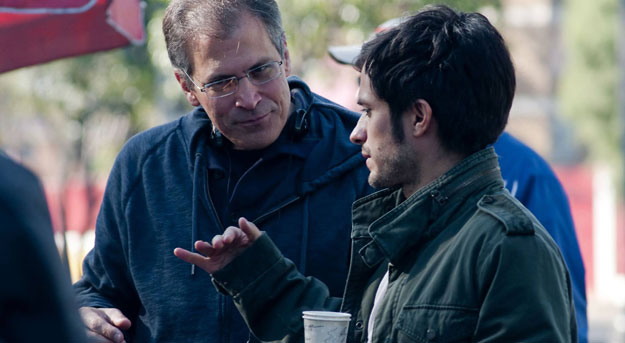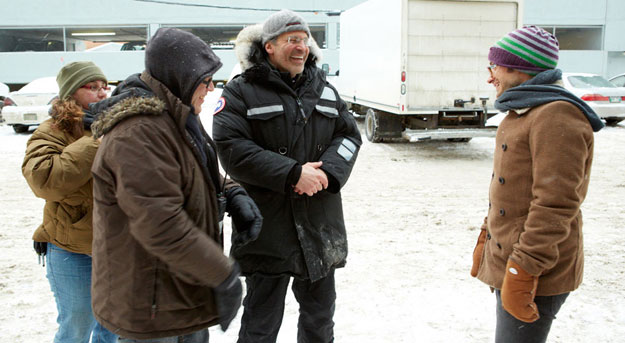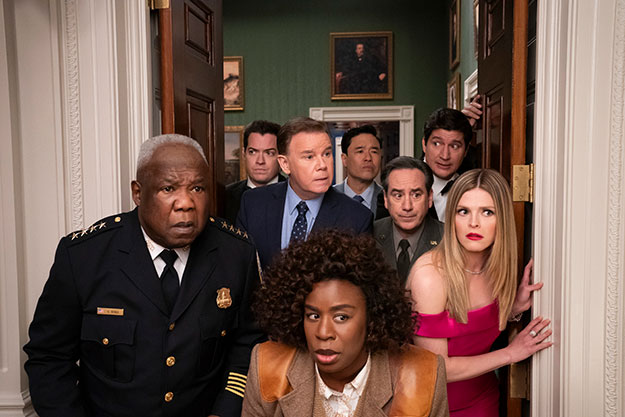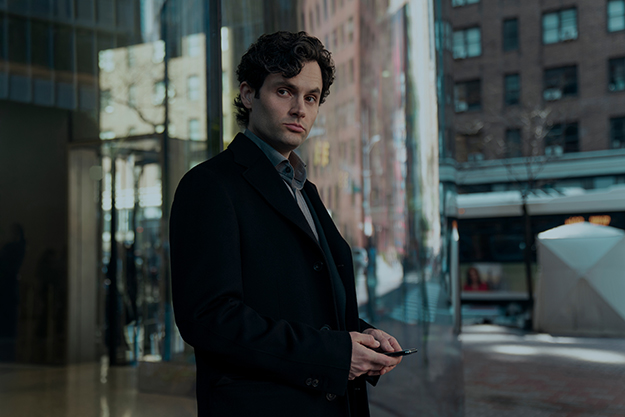EXCLUSIVE Interview: ‘You Are Killing Me Susana’ Director Roberto Sneider
'You Are Killing Me Susana' based on the novel 'Ciudades Desiertas' of José Agustín and written and directed by Roberto Sneider, is a funny and provocative rom-com about messy relationships, fidelity as something that goes out the window (sometimes literally), gender roles and cultural clashes that will make you laugh and question your perfect Hollywood ever after romantic endings. Eligio (Gael Garcia Bernal) a soap opera actor with a rather one-sided notion of marital fidelity, machista and narcissistic, wakes up one day to find his wife Susana (Verónica Echegui) a cold and distant ambitious writer has deserted him without saying a word. This surprises Eligio, who thinks their marriage is great. Eligio's cluelessness is very entertaining and sometimes will fuel in a bad way women's feminist side.
Thanks to the internet and everything being so readily available without any privacy nowadays, Eligio finds about Susana's whereabouts and takes off immediately leaving everything behind. Susana, he finds out, has gone to a writers' workshop at the fictional Middlebrook University in Iowa, but when he arrives he discovers Susana has started a fling with Polish poet Slawomir (Bjorn Hlynur Haraldsson) a longhair brawny man that never speaks in the film as a wonderful juxtaposition to Eligio. Hilarity ensues between Eligio trying to win Susana back in a desperate and clingy way, fighting against the giant Slawomir and clashing his mexicanism against the very american ways of Iowa.
We had the opportunity to sit down with the writer and director Roberto Sneider to talk about the film and explore the themes of the film a little further.
Rocio: You found a lot of humor in the clash of cultures between mexicans and americans, were you inspired in any personal anecdotes when you first came into the United States?
Roberto: Yes. When I first came here. Actually you know, that is very present in the novel as well. But I also added some things that happened to me, you know for example the taxi ride was something that happened to me when I went to Iowa to see the university where the story happens. Then from the airport to the university this happened to me. And at first I didn't think anything of it. You know it happened to me many times. You get the oh where're you from? I'm from Mexico. Oh you don't look Mexican. And then he went on to say you look like very distinguished or something like that. What did you say you know, he thought he was giving me a compliment.
Rocio: I get that a lot with with being Puerto Rican.
Roberto: And it's very insulting. It's very insulting, in the end, even though they're trying to compliment you. So it really shows off a really racist attitude. And so I thought that I have to put that in the movie. Also what he goes through in costumes that happened to me when they sent me to secondary inspection, not the glove part, but that was my fear, that's what I was imagining it will happen next. But they say I'm gonna be searching your private parts I'm gonna use the back of my hand as if that made it OK. So that exactly happened, they put me in a little room just like in the movie, you know the glove, that part I was like oh God I have to put it, but it is based on my experiences in this country. And that is actually what was interesting because when we shot the movie it was before all these craziness that's going on in this country.
So I think it's relevant at this point.
Rocio: Right, because I was going to ask, you have been in the states for quite a long time. Has that softened your Mexicanism being influenced by the American culture or has it been intensified trying to bring here a better understanding of the rich Mexican culture especially after our President has been putting a bad name on Mexicans.
Roberto: No I don't think he is bring a bad name to mexicans I think he is bad mouthing Mexicans, I think he's bringing a bad name to himself. He's a racist person. That's his shortcoming not ours.
Rocio: Well this guys it's affecting Americans, they are starting to believe what he says.
Roberto: He is unleashing the worst part of our people. That's for sure. But I think it's precisely a moment to reflect on that and to resist that. So I think it's very relevant to show this movie that comes out now in a moment where it's like let's unveil the even more subtle of this guy's expressions of discrimination that we experience because we do, we do a lot.
Believe me you know I was born into this. I mean I wasn't born in this country. I was born in Mexico and I have been in this country for 20 years and I don't look particularly Mexican necessarily. And yet I feel that discrimination every moment, it's interesting, they asked me Where are you from. And you know because of my accent they can tell that I'm not from here.
And then when I say I'm from Mexico, they go, oh! And it happens so often, it's horrible and I want to kick them. So I think it's important to talk about that even in the most progressive areas like here. I get that a lot. Which is really infuriating.
And I think it's important that we realize that in progressive states and progressive mediums supposedly like the film industry, like oh no they are more progressive groups, but it's not true, you know there's 3 percent of Hispanics in the DGA membership in Los Angeles. That's quite an accomplishment to do anything where you can have. Only three percent Hispanics. And it's a lot of hard work to find. So I think even in places that are legitimately more progressive there's still ignorance and discrimination. I don't know, I think anything we can do to make people aware of these things and to fight this situation is important.
Rocio: Will you explore the contrast of any other culture with the same emphasis and depthness? Besides the ones between USA and Mexico?
Roberto: In this particular case with this movie it's a Mexican guy who lives that. But I think he represents everyone else who comes into this country. I don't think it's a very specifically Mexican thing. It's the experience of a foreigner, is a Hispanic foreigner who could be from any nation and his experience would be very similar, the experience of a lot of foreigners in this country. Of course but the film talks mostly about relationships. But another important theme theme is this experience as a foreigner in the U.S..
Rocio: You tend to go for movies adapted from novels. Do you find more interesting getting these characters that are well developed already and just like deconstructing them and trying to find these little pieces and intricacies and complexities and give them even more depth rather than creating your own?
Roberto: I have written a number of screenplays, original screenplays but I've never been as convinced or excited as I have been with some wonderful novels that I've read and I've read a bunch of original screenplays. I just haven't found something that speaks to me as quite as eloquently as some of the best novels I've read so that's where I found material that really inspires me and that can keep me inspired for a long period of time which is what is needed to bring a film to completion. You need to fall in love with these characters, with these stories. And stayed in love for a long time. And that's what I found that so far in these novels.
Rocio: And the good thing is that you make people fall in love with them, hate them and then love them and then at the end kind of being completely confused because well you love them both and they are not perfect.
Roberto: I try to do that because that's the type of characters I enjoy. That's how we are as people we are complex we're contradictory. And the most interesting characters have those sort of ambiguities and even in my relationship, I've married for 30 years and believe me there's often times that I'm like, am I with the right person? I think most of us feel that way. So do I even have a definitive answer. No. You know at times of course I do, at times it's great. Then it's not so great. And so I think it's nice to explore that truly as it is rather than how most movies try to do which is like all people go through obstacles and then everything is resolved and is perfect or not, like they are horrible monsters and you need to get away. It's neither one. Neither one is true. It's it's complex and it's ambiguous. And so I think that's the best way to explore things.
Rocio: And comparing the 2 novels, Arrancame la Vida and Ciudades Desiertas from which this one Me Estas Matando Susana was based on. One was written by a woman and one by a man but they talk about the same thing. Women being repressed and living in a man's world in a way. How do you see they both represent these themes in their softness and in their roughness of trying to express those complexities from their different gender point of views?
Roberto: Yea I think that they're talking about like you say exactly the same thing. So it's obviously a theme that I'm very interested in and I find both perspectives very interesting and I just think that this sexist view of the world is damaging to both. Men and women suffer from it. And it's a challenge that there is no real easy answer to it. That's why it's more interesting. You know these roles thing between men and women in this modern times where we can have the luxury of redefining that, when before it was perhaps more sexist and the girls had to be more clearly defined. Now we have a bunch of freedoms where women don't have to have any children, there's many things that have changed. It's an interesting time to try to reinvent how we relate to them, to what our roles are. And it's challenging. So it's been a theme that I wanted to explore from a different point of view.
Rocio: More as a criticism to try to make people more aware and change or more like a statement, saying yes, we are behaving in this way, and will probably stay this way.
Roberto: The women are with the same mentality too. I think they do play this sexists social arrangements to their advantage very often. Well that for me is a theme from Arrancame La Vida, that they don't really realized that by taking what's good about it they're also taking what's bad about it even though they don't realize it. I think it's very much perpetrated by many women still. So by men as well. So I tried to question that and I don't know. I really think there's not a very clear cut answer. But what I do know is that the sexists attitudes are very destructive to both and that both reinforce it. I find truly as many women to be sexist as men just in different ways. Yes they do play to their advantage, the part that they like about this social arrangement.
Rocio: In this case with Susana we see that she finally leaves him and we're like rooting for her. Yeah. She woke up. She's gonna be an independent women, I mean she's going to get it for herself and then Eligio goes to find her and try to bring her back. But she doesn't go back. And you still like hoping that she's going to change things, that they are different but then at the end she comes back. Many feminist are going to take it as she submits back to him that she went to the same thing. In a kind of a contradiction of the transformation that we thought they had.
Roberto: Yeah I think they both transformed they both suffer through this experience. And my hope is that. You know, I don't see her as submitting. I also think she realized she played a role in this whole thing and she's not very expressive with him. She also has her defensive side. He's the one who's been playing the bad boy he is not so great but he loves her passionately and he tells her I love you and expresses that throughout constantly. And she never does, not once, in the movie he says that 40 times I think. I counted once but I forgot like 20 maybe. I don't know.
And you know she's playing a role in this. And I think she also believes that after he went through this experience that he's gonna grow, that he has grown even though she's not there to witness. She's also certain of some things, for example, instead of just going for the easy buck he's going for what his true passion was which I think is something that really bothered her when they were young. They fell in love, you get a sense that they both wanted to do things that were worthwhile. He was an ambitious actor and just like she wanted to write and followed her dreams but he just sold out you know he is into partying and he lost his way in every sense.
I think for her too, it's kind of hopeful. OK he's turning his back on that because he's not partying every day, now he's working on something that's fulfilling to him. He's grown and she loves this guy and you can't blame her. He's charismatic, he's good looking, he's fun, he's passionate and there's an ugly side to him, a very ugly one. I think women can relate to fall in love with guys like that and hoping that they're going to change.
Rocio: Yea!
*WE BOTH HAD A BIG BIG LAUGH*
Is he gonna change. I truly don't know and I think it's fine that we don't know. But I wouldn't wanted to be perceived that she submits I think she's going to give it one more go if this is a great idea or not. I'm not sure.
Rocio: So it's more like what came first the chicken or the egg. Of who started this.
Roberto: They both played a part on how this relationship ended and he obviously is very insecure about his masculinity in this relationship because she is beautiful, she's strong, she's independent. And he reacts. Yeah it's hard for him and every opportunity he gets to feel more appreciated as a man, he goes for it. So I think she could play a part in making him feel better about himself too.
Rocio: True.
*LAUGH*
Roberto: So that's kind of my hope that she's gonna realize that too. Yeah. She's no angel.
Rocio: The ending is what got me like how at the end he spanks her for like leaving him and escaping from him like you were a bad girl. And I know this novel was written in the 80s so it's been a long time and things have changed. And did you thought that it was going to be a problem with feminists and how people were gonna take it ? Did you thought about changing it in some more contemporary way?
Roberto: I thought, I shouldn't try to make it politically correct. I think I should just make it you know be truthful to their characters. And I thought it was. It was funny. And I don't think it's mean spirited. I don't think he's trying to subject her, he's pissed and he wants to get past everything he saw and he feels that these little ritual can help him get through that. But it also shows you he's still very immature. And it's fine. And at the end you go like wow is this a good idea that they are together? I don't know. It's fine to leave it that way. Yeah they're going to give it another shot. But is this going to work? You don't know I want to think they definitely both grew. I think that they really love each other. I'm a romantic. So for me. This is like a romantic ending to a messy story with imperfect characters.
Rocio: Which this ending happen more often than we want to think, in real life.
Roberto: Yeah I think in most cases we're very imperfect. And yet we shouldn't NOT be romantics because we're both imperfect but our loved one is not perfect and you're not perfect. Does that mean that you can't believe in love? No, I don't think so. I think we can still be real romantics and say, ok, it's going to be messy and complicated because we are messy and complicated and that's ok.
Rocio: The more passion there is the more complicated it is.
Roberto: And the more life there is. So yes, passion it's dangerous. It's going to bite us in you know where, but it's OK.
You are Killing Me Susana in theaters February 17.

















